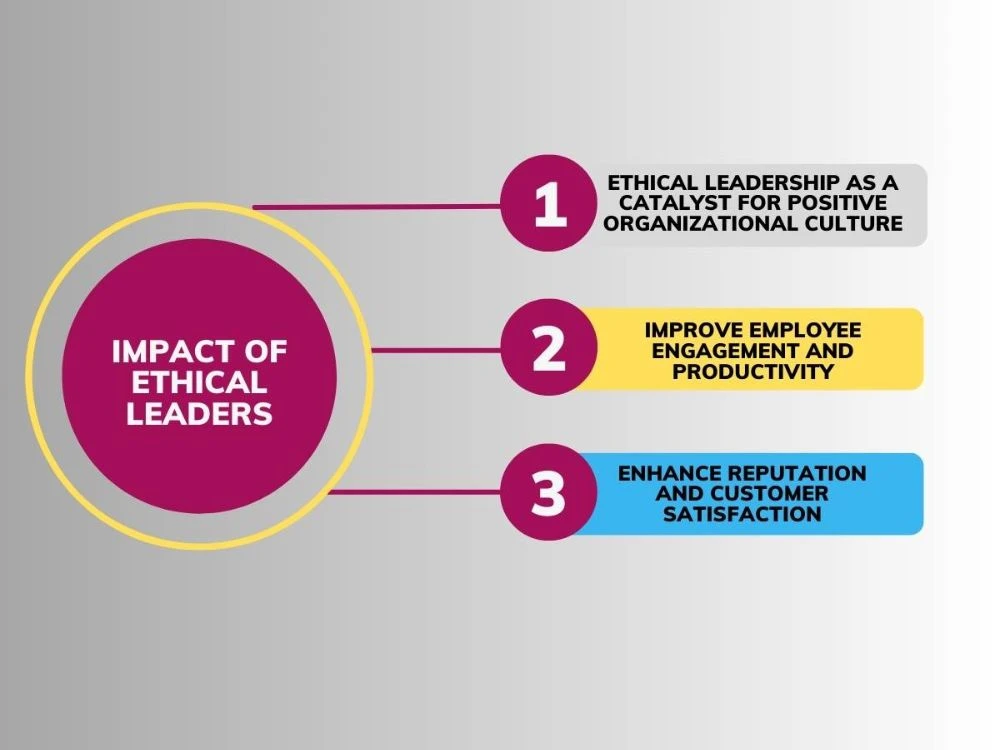
5 Traits of Ethical Leaders: Transforming Today's Business Landscape
Do you know what makes a leader truly exceptional in today’s business world? The answer lies in ethical leadership. This vital approach fosters trust and respect, thereby strengthening the connection between leaders and their teams.
In modern organizations, ethical leadership is viewed as a crucial element because it has a positive impact on the organization. Plus, it incorporates 5 main pillars that are known as;
- Respecting Others
- Serving Others
- Showing Justice
- Manifesting Honesty and
- Building Community
Moreover, ethical leadership helps organizations navigate intricate ethical difficulties and make decisions that align with ethical principles and values. It also improves an organization's reputation, employee engagement, and overall performance.
Key Takeaways
- Understand how ethical leadership enhances trust, respect, and team connection.
- Learn the five crucial traits of ethical leaders: integrity, accountability, transparency, empathy, and consistency, and their impact on organizational culture.
- See how ethical leaders drive change, resolve ethical issues, and foster accountability and trust.
- Learn how ethical leadership boosts employee engagement, work productivity, reputation, and customer satisfaction and offers a strategic advantage.
- Get inspired by ethical leaders like Steve Jobs, Mary Barra, and Satya Nadella, who balanced innovation, tackled ethical challenges, and promoted inclusivity.
The Influence of Ethical Leaders in Driving Positive Change
Driving positive change in an organization is salient, where ethical leaders have a profound influence in making this change. They implement ethical values and principles that help motivate and enhance employees' engagement in organizational activities.
It's also helpful to make the desired positive changes. Ethical leaders mitigate workplace conflicts related to ethics and give adequate value to the employees. This positively makes changes in the organization.
Trait 1: Integrity

What is Integrity in Leadership?
Integrity is a prominent characteristic that every leader should have. It includes the honesty and trustworthiness of the leaders towards the policies and regulations while maintaining their actions with sincerity.
Leaders who have this attribute keep their words or promises in actions, where there is no chance for cheating. Plus, they create a culture of trust and respect, which helps boost the value of the organization and its employees.
The Significance of Integrity in Ethical Leaders
Ethical leaders must have this attribute because integrity is one of the most important things when leading a team of employees or an organization. It showcases that organizational values and policies are kept to the standard level.
Moreover, ethical leaders don’t even try to break them or have unwanted intention to do so. The overall value and reputation of the organization are enhanced when leaders have the ethical trait of “integrity”.
Trait 2: Accountability

Understanding Accountability in Ethical Leadership
Accountability is another crucial trait in ethical leadership, where leaders should take responsibility for themselves and team members' actions that take place in an organization. This attribute is important for a leader who should lead a team or an organization by taking responsibility into their hand.
It improves the ethical standards of an organization, promotes collaboration, and creates a culture of accountability. Ethical leaders who have this characteristic can promote open communication and hold themselves and team members accountable for every work task they perform.
Creating a Culture of Accountability in Organizations
In every organization, it's essential to create a culture of accountability. Every leader should have this trait, which allows them to ensure a proper workflow and mitigate unnecessary risk occurrences. If leaders are unaware and unaccountable for things that happen under their scope, it can lead to many organizational issues.
To avoid this, they should always move forward to take accountability for their work functions. This culture improves the ethical standards of a business and drives success by preventing related issues from happening.
Trait 3: Transparency

The Role of Transparency in Ethical Leadership
Leaders should have this transparency attribute to maintain open communication and delegate duties and responsibilities to their subordinates. This means leaders should always be transparent in providing sufficient information. By being transparent, leaders can effectively increase employee engagement.
Here, employees or team members feel valued, which helps increase coordination. Moreover, transparency in ethical leadership encourages leaders to listen to others and allocate duties evenly. Therefore, every leader should have this trait of being transparent in working together with their subordinates to uphold the values.
Establishing Transparent Communication Channels
In ethical leadership, it's vital to establish transparent communication channels that foster open and best communication. Leaders have to create a transparent environment where employees freely communicate and provide honest suggestions that make them feel valued.
It helps decision-making become simple at all levels of the organization and guarantees good flows of information from different levels. Transparent communication channels such as regular team meetings, feedback mechanisms, training, and development can foster engagement. Plus, exchanging key ideas would help make important business decisions.
Trait 4: Empathy

The Power of Empathy in Ethical Leadership
Empathy is a must-have trait for ethical leaders, where understanding other people's emotions, perspectives, and state of mind is important to build ethical relationships. Leaders shouldn’t make decisions based on their sole perspective. Rather, they should know what their team members are going through related to completing organizational tasks.
By understanding this, they can understand their team members better, which helps implement strategies that improve employee performance. Showing compassion and reducing workloads are necessary for a leader to get good engagement from workers.
Additionally, boosting a positive and engaging work environment significantly boosts morale. A great way to do this is through humor. For example, sharing work-related memes can lighten the mood, making team members feel more connected and valued. These memes serve as a reminder that leaders understand the daily challenges of employees.
Building Stronger Relationships Through Empathy
Empathy creates strong relationships among leaders and their team members. It ensures understanding of everything from the employees’ perspective, which helps leaders build team dynamics. If leaders are strict towards their employees, it may distract them and negatively impact their performance.
Thus, leaders should consider empathy when making decisions and allocating tasks. At the same time, this attribute shouldn't be confused with being overly friendly and losing control. If that happens, it may cause a lack of discipline and respect within the team.
Balancing empathy with clear boundaries and expectations ensures that leaders maintain authority while still being approachable and supportive. This balance may help in creating a harmonious and productive work environment where employees feel valued and understood, yet remain focused and motivated.
Trait 5: Consistency

The Importance of Consistency in Ethical Leadership
Consistency is an important trait for leaders to establish ethical policies and values in an organization. Ethical leaders strive to work their best on stuff consistently and push their team members to do things in the same way.
This specific trait of a leader can motivate employees or team members to perform their tasks diligently without having a giving-up mentality. This is one of the most valuable characteristics of an ethical leader, where a giving-up mentality could demotivate other employees. Therefore, a good leader should have a consistent trait. Also, check our article on consistency quotes to stay focused.
Building Trust through Consistent Practices
Leaders build trust among their team members through consistent practices, demonstrating a mentality of perseverance and dedication. For example, a team leader in a sales department is given a massive sales target for the coming quarter. The consistent ethical leader will strive his/her best to achieve this target without complaining or giving up.
This mindset illustrates the leader's continuous hard work and consistency, which helps motivate team members. Further, consistently performing tasks showcases a leader's qualities that positively influence team motivation. Building trust through these consistent practices fosters a positive mindset and paves the way for success.
Impact of Ethical Leaders on the Business Landscape

Ethical Leadership as a Catalyst for Positive Organizational Culture
There is no doubt that ethical leadership is a catalyst for a positive organizational culture. Leaders who have these characteristics uphold a workplace culture and environment. Plus, these traits influence other employees in the organization positively.
Unlike unethical leaders, ethical leaders promote values and integrity, respect employees, and provide consistent support. This encourages team members and nurtures an inclusive environment.
Improve Employee Engagement and Productivity
When an organization has ethical leadership, it ensures a high rate of employee engagement and productivity. This is because employees like to be valued and trust the organization when its leaders are behaving ethically.
Ethical leaders give priority to understanding their employees, trusting them, and openly communicating to help establish good employee engagement toward work-related tasks. They work diligently to enhance business productivity.
If leaders don’t have ethical policies and practices, it may negatively impact employees' commitment to work. Therefore, it's vital to have ethical leadership for enhanced engagement and productivity.
Enhance Reputation and Customer Satisfaction
Ethical leadership enhances organizational values, which helps improve their reputation and customer satisfaction. When leaders have ethical policies and work practices, they tend to create a positive working culture, environment, employee engagement, and productivity.
This contributes to enhancing the business value in various stages such as operation, manufacturing, supply chain, and so on. By enhancing the value of necessary services, ethical leadership improves the business reputation in the industrial market.
Case Studies: Exemplary Ethical Leaders

Steve Jobs: Balancing Innovation and Ethical Responsibility
As we all know, the co-founder of Apple Inc. Steve Jobs was well known for his outstanding leadership and innovative vision. While Jobs was praised for his transformative products and groundbreaking designs, he also faced some ethical challenges throughout his career.
One memorable example was the labor conditions in Apple's supply chain. Jobs took necessary action by implementing more rigorous supplier standards and undertaking endeavors to improve workers' rights. His commitment to balancing innovation and ethical responsibility revealed a willingness to manage ethical concerns and work toward positive change within the industry.
Mary Barra: Transforming General Motors through Ethical Leadership
Mary Barra is the CEO of General Motors (GM), who symbolizes ethical leadership through her transformative efforts within the company. Barra encountered a major crisis when it was revealed that defective ignition switches in GM vehicles led to multiple accidents and fatalities.
In response, she brought some powerful measures to address the issue and prioritize customer safety. Barra started a complete investigation that enforced more rigid safety protocols and established a compensation fund for affected individuals.
Her commitment to transparency, accountability, and prioritizing customer safety first changed GM's culture and restored trust in the company. Barra's ethical leadership functions as a persuasive example of how leaders can drive positive change.
Satya Nadella: Fostering Inclusive Ethical Leadership at Microsoft
As the CEO of Microsoft, Satya Nadella is renowned for his commitment to inclusive and ethical leadership. Under his direction, Microsoft has made substantial developments in promoting a diverse and inclusive work environment.
Nadella has supported initiatives to bridge the gender and diversity gap in the company, which promoted equal opportunities for all employees. Further, he has prioritized ethical considerations, emphasizing the essence of responsible AI development and data privacy.
Nadella's focus on inclusivity and ethics hasn't only improved Microsoft's reputation but also boosted other organizations to prioritize diversity and ethical practices.
Final Thoughts
Ethical leadership plays a prominent role in making positive changes in the organization and fosters a robust organizational culture. The five crucial traits of ethical leaders, such as integrity, accountability, transparency, empathy, and consistency, sufficiently contribute to building trust, enhancing employee engagement, and improving productivity.
Case studies of exemplary ethical leaders like Steve Jobs, Mary Barra, and Satya Nadella showcase the transformative result of ethical leadership in balancing innovation, addressing problems, and enabling inclusivity.
FAQs
Q1: What are the key traits of ethical leaders?
The key traits of ethical leaders are known as integrity, accountability, transparency, empathy, and consistency.
Q2: What role does transparency play in ethical leadership?
Transparency in ethical leadership facilitates open communication, produces trust, and enables effective decision-making.
Q3: How does empathy benefit ethical leaders?
Empathy allows ethical leaders to comprehend and support their team members, which leads to a stronger relationship and increased engagement.
Explore Related Posts
https://smarttoolsai.com/post/10-essential-work-related-strengths-for-professionals
https://smarttoolsai.com/post/funny-work-memes-and-create-your-own-with-our-meme-generator
.webp)